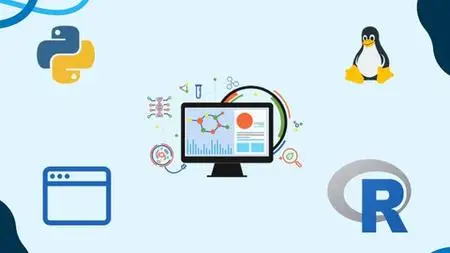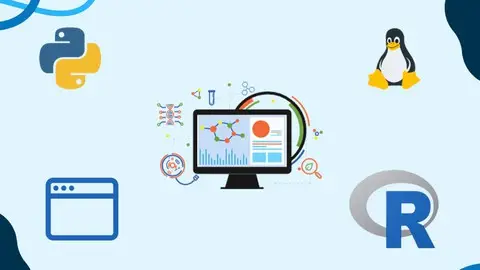Bioinformatics Mastery: Your Journey From Beginner To Expert
Published 12/2023
MP4 | Video: h264, 1920x1080 | Audio: AAC, 44.1 KHz
Language: English | Size: 10.18 GB | Duration: 15h 39m
Published 12/2023
MP4 | Video: h264, 1920x1080 | Audio: AAC, 44.1 KHz
Language: English | Size: 10.18 GB | Duration: 15h 39m
Bioinformatics Beginners to advance course to learn in 10 hours to understand the simple and complex topics of bioinfo
What you'll learn
Foundational Understanding: Acquire a solid grasp of fundamental bioinformatics concepts, including data analysis, algorithms, and computational techniques.
Practical Skills Development: Develop hands-on proficiency in utilizing popular bioinformatics tools and software for tasks such as sequence analysis,
Data Integration Techniques: Learn advanced methods for integrating diverse biological data types, enabling a holistic approach to understanding complex data.
Problem-Solving Strategies: Enhance problem-solving skills by applying bioinformatics approaches to real-world biological questions and challenges.
You will learn about the history and applications of bioinformatics
You will learn Basic demonstration of Bioinformatics tools
Different databases used in bioinformatics
Interpretation of Sequence Alignment
Tools Used in sequence Alignment in bioinformatics
Alignment Methods and Representation
They will be able to use and know different categories of sub-databases of NCBI.
Plant Genome Databases
Secondary Databases in Bioinformatics
Protein basic Concepts
Understanding different techniques for protein prediction
Understanding Comparative or Homology modeling
Protein Modeling Using GUI Interface
Swiss Model hands on training
Protein Modeling Using CLI Interface
Protein Modeling Using Modeller
The basics of Next Generation Sequencing and how it can be used for Differential gene expression analysis via RNA sequencing.
Quality Control of NGS data
Trimming the Reads of NGS Data
Different tools for aligning reads to genome
Differential Expression Analysis.
Ultimately understand how technologies like RNA sequencing could be used to identify specific genes that can cause certain conditions.
Heatmap Generation of Results
Interpret the results of DEG's
Understanding Bioinformatics Pipeline concept
Use of Galaxy for NGS data processing
Introduction to R
Data Analysis Using R
Introduction to Linux
Data Analysis using Linux
Introduction to Python
Data Analysis using Python Language
Requirements
Understanding Bioinformatics Basic Concepts
Background knowledge of Biology and genetics
Description
Get ready to dive into an extensive and in-depth bioinformatics course that is worth every penny and second of your time! This comprehensive program covers a wide range of bioinformatics topics, taking you from a beginner stage to a master level in the field.The Bioinformatics course offers a holistic overview, encompassing all the essential concepts, tools, and techniques employed in the analysis and interpretation of biological data.We kick off with a captivating Introduction to Bioinformatics, where you'll explore the rich history and development of the field, understanding its pivotal role in modern biology research. Discover the diverse applications of bioinformatics in genomics, transcriptomics, proteomics, and metabolomics, and witness how it revolutionizes these areas.In the following section, we delve into Biological Databases. Gain proficiency in navigating and utilizing various database types, including NCBI, Ensembl, and UniProt. Learn the art of effectively searching these databases and master the management of biological data.Prepare yourself for an enlightening exploration of File Formats in Bioinformatics. Familiarize yourself with commonly used file formats such as FASTA, FASTQ, SAM/BAM, and VCF. Discover valuable tools and techniques for manipulating, converting, and parsing these formats, equipping yourself with essential skills for data manipulation.Next up, we tackle the intricacies of Sequence Alignment and Tools. Delve into the principles underlying sequence alignment and gain hands-on experience with powerful tools and algorithms like BLAST, ClustalW, and MUSCLE. Learn to interpret and analyze alignment results, extracting meaningful insights from your data.Command Line Bioinformatics takes center stage in the subsequent section. Unleash the potential of bioinformatics tools and software using the command line interface (CLI). Master fundamental UNIX commands, navigate directories, create and edit files, and seamlessly run bioinformatics tools from the command line.In Bioinformatics and Genomics on GUI and CLI, we equip you with a versatile skill set. Learn how to leverage graphical user interfaces (GUIs) and CLI-based tools simultaneously. Explore popular GUI-based bioinformatics tools like Geneious and CLC Bio, alongside CLI-based tools such as BWA and GATK. Gain the flexibility to choose the most suitable approach for your bioinformatics endeavors.As the course draws to a close, we delve into Bioinformatics and Proteomics. Unlock the principles of proteomics and delve into tools and techniques for protein identification, quantification, and analysis. Explore how bioinformatics aids in predicting protein structure and function, as well as designing drugs and therapies based on protein interactions.Each section of this course offers practical exercises, real-world examples, and valuable insights. You'll work with actual biological data, honing your skills in interpreting and visualizing results, and gaining a profound understanding of the challenges and opportunities bioinformatics presents.Are you ready to embark on this transformative bioinformatics journey? Enroll in our course today and unlock the limitless potential of this captivating field!
Overview
Section 1: Introduction to Bioinformatics
Lecture 1 Course Introduction
Lecture 2 Introduction of Bioinformatics field
Lecture 3 History of Bioinformatics
Lecture 4 Components of bioinformatics
Lecture 5 Working in Bioinformatics
Lecture 6 Career Outlook for bioinformaticians
Lecture 7 Careers for bioinformaticians
Lecture 8 Applications of Bioinformatics
Lecture 9 Applications of Bioinformatics Pt:2
Section 2: Bioinformatics Databases and File Formats
Lecture 10 Introduction of Biological Databases
Lecture 11 Types of Biological Databases
Lecture 12 Difference Between Primary and Secondary Databases
Lecture 13 Primary Databases
Lecture 14 Explaining Primary Databases
Lecture 15 Explaining Primary Databases pt:2
Lecture 16 Explaining Primary Databases Last
Lecture 17 Introduction of Secondary Databases
Lecture 18 Explaining Secondary Databases
Lecture 19 Explaining Secondary Databases pt:2
Lecture 20 Explaining Secondary Databases Pt:3
Lecture 21 Explaining Secondary Databases Pt:4
Lecture 22 Introduction of Literature Databases
Lecture 23 Explaining Literature Databases
Lecture 24 Introduction of File Formats
Lecture 25 Explaining different File Formats
Lecture 26 Summary of File Formats
Section 3: Plant Databases
Lecture 27 Plant database introduction
Lecture 28 Types Of Databases
Lecture 29 Brassica Database
Lecture 30 Phytozome
Lecture 31 Ensembl Plants
Lecture 32 Gsad Database
Lecture 33 NCBI Database
Lecture 34 Pgdjb Database
Lecture 35 Ptgbase Database
Lecture 36 Rdna Database
Lecture 37 Gdb Browser
Section 4: Sequence Alignment in Bioinformatics
Lecture 38 Introduction of Sequence Alignment
Lecture 39 History of Sequence Alignment
Lecture 40 Alignment Methods
Lecture 41 Interpretation of Sequence Alignment
Lecture 42 Representation and Storing of Sequences
Lecture 43 Significance and Uses of Sequence Alignment
Lecture 44 Software Used for Sequence Alignment
Lecture 45 Pairwise Sequence Alignment
Lecture 46 Tools for Pairwise Sequence Alignment
Lecture 47 Multiple Sequence Alignment
Lecture 48 Tools for Multiple Sequence Alignment
Lecture 49 Clustal tool for alignment
Section 5: Proteomics Using Bioinformatics
Lecture 50 Section Introduction
Lecture 51 Explaining Homology Modeling
Lecture 52 GUI based Modeling of Proteins
Lecture 53 Command Line based Protein Modeling
Lecture 54 De-Novo and Machine Learning Methods
Lecture 55 Protein Structure Prediction
Lecture 56 Protein Visualization Analysis
Lecture 57 Phylogenetics Analysis
Lecture 58 Motifs and Domains analysis
Lecture 59 Protein Physical Parameters and Location Analysis
Lecture 60 Protein-Protein Interaction and Enrichment Analysis
Lecture 61 Proteins Pathway Analysis
Section 6: Linux in Bioinformatics (Command Line Bioinformatics)
Lecture 62 Introduction and Why CLI in Bioinformatics
Lecture 63 CLI and GUI Explanation
Lecture 64 if we already have Graphical user interface system why we should use CLI?
Lecture 65 Short Practical with Programming Language
Lecture 66 Why Would You Use CLI over GUI?
Lecture 67 Foundation behind CLI Shell explanation
Lecture 68 Drawbacks of CLI and GUI
Lecture 69 Linux Introduction and Usage Over years
Lecture 70 Linux Distros
Lecture 71 Why Ubuntu Operating System
Lecture 72 WSL Explanation
Lecture 73 Linux Vs Unix
Lecture 74 (Practical) Making A Subsystem For Linux In Windows OS
Lecture 75 Linux File Handling Commands
Lecture 76 Accessing And Creating Files In Windows Os
Lecture 77 Basic Process Management Commands for Linux OS
Lecture 78 E-utilities on the Linux Command Line
Lecture 79 Installing NCBI through CLi
Lecture 80 Entrez Direct Functions
Lecture 81 Mrna And Protein Seq Retrieval
Lecture 82 Batch Retrieval of Protein Using Taxon Id
Lecture 83 Retrieving CDS From Reference Genome
Lecture 84 Explaining Different Commands
Lecture 85 Commands
Section 7: NGS Data Analysis using Galaxy and Linux
Lecture 86 Introduction of Course Section
Lecture 87 Next-generation sequencing
Lecture 88 Generations of Sequencing
Lecture 89 NGS Workflow
Lecture 90 SRA Database introduction
Lecture 91 SRA File
Lecture 92 Galaxy Server Intro to Goals
Lecture 93 Galaxy Server And Objects
Lecture 94 Getting Onto Galaxy
Lecture 95 Tools For NGS Data Analysis
Lecture 96 Getting SRA Runs from Databases And platform
Lecture 97 Ncbi Genome to Galaxy
Lecture 98 Getting Sra Runs To Galaxy
Lecture 99 Fastqc Tool To Dataset Generated Dataset
Lecture 100 Trimmomatic Tool On Dataset
Lecture 101 Alignment/genome Mapping
Lecture 102 Abundance Estimation Tool On Dataset
Lecture 103 From Values To Visuals (Heatmap)
Lecture 104 Understanding NGS For Linux
Lecture 105 Getting the SRA Reads
Lecture 106 Bioinformatics Pipeline
Lecture 107 Checking the Quality of Data
Lecture 108 Quality Trimming of data
Lecture 109 Aligners and Aligning Reads to genome
Lecture 110 SAM and Bam File Indexing and Sorting
Lecture 111 Feature Extraction
Lecture 112 Pipeline Code
Section 8: Variant Calling Analysis Using Linux
Lecture 113 Introduction of Course Section
Lecture 114 Variants and Types
Lecture 115 Understanding the Metadata and Software's
Lecture 116 Getting Data From SRA Using SRA Toolkit
Lecture 117 Quality Control and Trimming
Lecture 118 Sam and Bcf Tools and Fixing NS and Calling Variants
Lecture 119 Alignment to Reference Genome
Lecture 120 Separation of SNP's and Indels Variants
Lecture 121 Visualizing Variants Using IGV and UCSC Browser
Lecture 122 Pipeline Code
Section 9: Python for Bioinformatics
Lecture 123 Introduction to Bioinformatics and Why Python
Lecture 124 BioPython Introduction
Lecture 125 GitHub Repository for Python
Lecture 126 Setting up Coding Environment
Lecture 127 Explaining the libraries for the course
Lecture 128 Advance File Formats of Bioinformatics with BioPython
Lecture 129 Sequence Analysis Using Biopython
Lecture 130 Database Retrieval/Accessing Using Biopython
Lecture 131 Working With Genomes Using Biopython
Lecture 132 Phylogenetic Tree Construction using Biopython
Lecture 133 Proteomics Analysis Using Biopython
Lecture 134 Machine Learning in Bioinformatics
Section 10: R for Bioinformatics
Lecture 135 Introduction to Bioinformatics and R: Exploring the Intersection of Biology
Lecture 136 Getting Started with R: Installation and Variables Understanding
Lecture 137 Working with R Packages: Installing, Loading, and Exploring Bioinformatics
Lecture 138 Differential Gene Expression Analysis with Deseq2: Preparing Data
Lecture 139 Deseq2 Code Understanding
Lecture 140 Converting Ensembl Gene IDs to Gene Symbols: Using R Techniques and Packages
Lecture 141 Visualizing Gene Expression Data: Creating Stunning Plots with ggplot2
Lecture 142 Introduction to Single-Cell RNA Sequencing (scRNA-seq) Data Analysis
Lecture 143 Exploring scRNA-seq Code: Cell Trajectories and Gene Expression Dynamics
Lecture 144 GitHub Source Code for R
Section 11: Microarray Data Analysis Using R
Lecture 145 Introduction of Microarray
Lecture 146 Microarray Databases
Lecture 147 Microarray Analysis Using GEO2R
Lecture 148 Microarray Analysis on R
Lecture 149 Source Code for Microarray Section
Biologists and Life Scientists: Biologists, molecular biologists, geneticists, and researchers in the life sciences who want to enhance their skills in bioinformatics.,People generally interested in new research methodologies and would like to try them themselves!,Beginner Bioinformaticians looking to understand the process of Proteins,Beginner Bioinformatics Students,People interested in researching the effects of different pathologies on gene expression or even how gene expression changes over the course of a cell's growth curve.,People looking to carry out differential gene expression and gene ontology analysis.,People who want to carry out bioinformatic analysis without the need for complex code.,Researchers are Encouraged to take this Course.,Beginners Bioinformatics Students,Industry Professionals wants to learn Bioinformatics.



